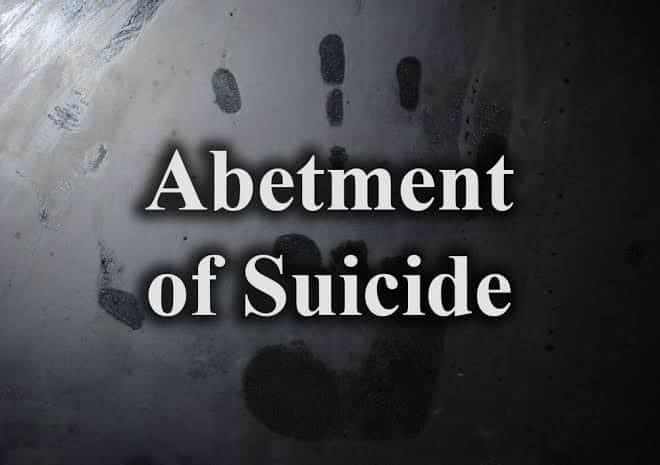
Abetment of suicide
Introduction
The abetment of suicide, as defined under Section 306 of the Indian Penal Code (IPC), carries significant legal implications and moral considerations. In legal parlance, abetment refers to actively encouraging, instigating, or aiding someone to commit a criminal act. When it comes to suicide, abetment involves intentionally driving or pushing an individual towards taking their own life. This grave offense is addressed under Section 306 IPC, which delineates the legal boundaries and repercussions of such actions.
Abetment of Suicide: The Meaning and Implications
The abetment of suicide holds profound implications within the framework of criminal law. It entails any act or omission that leads a person to contemplate or carry out the act of taking their own life. Such actions can range from persistent mental harassment and emotional abuse to providing direct assistance or encouragement to commit suicide. Understanding the nuances of abetment is crucial, as it involves a complex interplay of psychological, social, and legal factors.
Deciphering Section 306 IPC: Key Ingredients
Section 306 IPC outlines the essential ingredients necessary to establish the offense of abetment of suicide. These ingredients serve as the legal yardstick to determine culpability and ensure justice is served. To establish abetment of suicide, certain essential elements must be satisfied:
Instigation: The accused must have instigated the deceased to commit suicide. Instigation implies actively encouraging, provoking, or urging someone to take their own life.
Aid or Encouragement: Merely advising or suggesting suicide may not suffice for abetment unless it can be shown that such advice or suggestion substantially contributed to the act.
Intentional Act: The abetment must be intentional, indicating a deliberate effort on the part of the accused to push the victim towards suicide.
Resulting Suicide: The suicide must be a direct consequence of the abetment provided by the accused. It must be proven that the victim would not have committed suicide without such instigation or aid.
Penalties:
The punishment for abetment of suicide under Section 306 of the IPC is imprisonment for a term extending up to ten years, along with a fine. However, the actual sentence may vary depending on the circumstances of the case, including the severity of the abetment and the impact on the victim’s mental state.
Notable Case Laws:
Ramesh Kumar v. State of Chhattisgarh (2001): In this case, the Supreme Court held that merely because the deceased was hypersensitive or overreacted to ordinary circumstances would not absolve the accused from liability if they intentionally provoked the victim to commit suicide.
Gurcharan Singh v. State of Punjab (2002): The Supreme Court reiterated that for abetment of suicide to be established, there must be a clear mens rea (guilty mind) on the part of the accused, along with evidence demonstrating active encouragement or inducement.
S.S. Chheena v. Vijay Kumar Mahajan (2010): This case emphasized that the intention to push the victim towards suicide must be proved beyond reasonable doubt, and the accused cannot be held liable solely based on conjecture or suspicion.
Challenges and Controversies Surrounding Abetment of Suicide
Despite its clear legal framework, the abetment of suicide remains a contentious issue fraught with challenges. Proving the culpability of the accused beyond a reasonable doubt can be arduous, particularly in cases where the evidence is circumstantial or the intent is difficult to establish conclusively. Moreover, societal attitudes towards mental health and suicide often influence perceptions of culpability, adding layers of complexity to legal proceedings. Addressing these challenges requires a multifaceted approach that encompasses legal reforms, awareness campaigns, and mental health advocacy.
Conclusion
The abetment of suicide, as delineated under Section 306 IPC, underscores the gravity of actions that lead to the loss of human life. It demands a nuanced understanding of legal principles, psychological dynamics, and societal contexts to ensure justice is served. By upholding the integrity of the law and fostering greater empathy and support for those in distress, we can strive towards a society that values human life and safeguards the well-being of its members.
In conclusion, the abetment of suicide is a complex legal issue that requires careful examination and consideration of various factors. Section 306 IPC provides the legal framework for addressing this offense, but its application must be guided by principles of justice, compassion, and understanding. As we navigate the complexities of this issue, it is essential to uphold the sanctity of human life and promote measures that prevent the tragedy of suicide.


